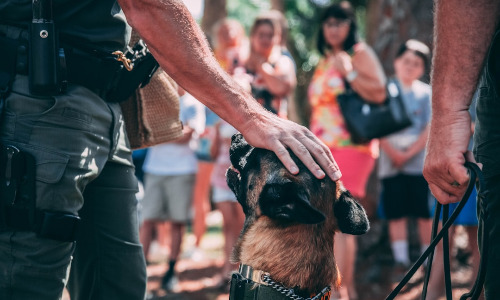
Police dogs are invaluable partners in law enforcement, working tirelessly to keep our communities safe. Ensuring they are well-fed and in optimal health is essential for their performance on duty. In this guide, we’ll explore how to keep your police dog active, healthy, and ready for action, with a focus on their dietary needs and the breeds commonly used in law enforcement.
Breed-specific Dietary Requirements: Different breeds of police dogs have varying nutritional needs based on their size, activity level, and specific job requirements. Here’s a brief overview of dietary considerations for common police dog breeds:
- German Shepherd: Known for their intelligence and versatility, German Shepherds are a popular choice for police work. They require a balanced diet rich in protein to support their muscular build and high energy levels. Look for quality dog food formulated for active breeds, with ingredients like meat, vegetables, and essential vitamins and minerals. Also look for food rich in chicken, lamb, or fish, with added glucosamine for joint health.
- Belgian Malinois: Belgian Malinois are agile and highly trainable, making them excellent police dogs for tasks such as detection and apprehension. Their diet should include a high-protein, high-fat formula to sustain their energy levels and support their intense physical activity. Large Breed working dog food is worth considering for these police dogs. Consider supplements like glucosamine and omega-3 fatty acids to maintain joint health and mobility.
- Labrador Retriever: Labradors are known for their friendly nature and versatility, often employed in roles such as detection and search and rescue. Their diet should focus on lean protein sources, such as chicken, turkey and fish, to prevent weight gain, as well as complex carbohydrates for sustained energy. Avoid overfeeding to prevent obesity, which can impact their agility and overall health.
- Bloodhounds: These tireless scent trackers need a moderate-protein diet (20-25%) with good levels of carbohydrates for long sniffing sessions. Look for easily digestible ingredients to avoid stomach upset.
Keeping Police Dogs Active and Healthy
- Regular Exercise: Police dogs require daily exercise to maintain their physical fitness and mental well-being. Incorporate activities like obedience training, agility courses, and scent work into their routine to keep them mentally stimulated and physically fit.
- Veterinary Care: Regular veterinary check-ups are crucial for monitoring your police dog’s health and addressing any medical issues promptly. Vaccinations, parasite control, and dental care are essential aspects of maintaining their overall well-being.
- Proper Hydration: Ensure your police dog has access to fresh, clean water at all times, especially during training and active duty. Proper hydration is vital for regulating body temperature and supporting optimal performance.

By understanding the dietary requirements and specific needs of different police dog breeds, you can ensure your canine partner remains healthy, active, and ready for action. With a balanced diet, regular exercise, and attentive care, your police dog will continue to excel in their vital role in law enforcement.
Remember to consult with your veterinarian to tailor a nutrition and wellness plan that suits your police dog’s individual needs. Together, you can ensure they receive the best possible care to support their invaluable contributions to keeping our communities safe.
For more information on food for police dogs and maintaining their health and fitness, stay tuned to our blog for expert insights and tips.











